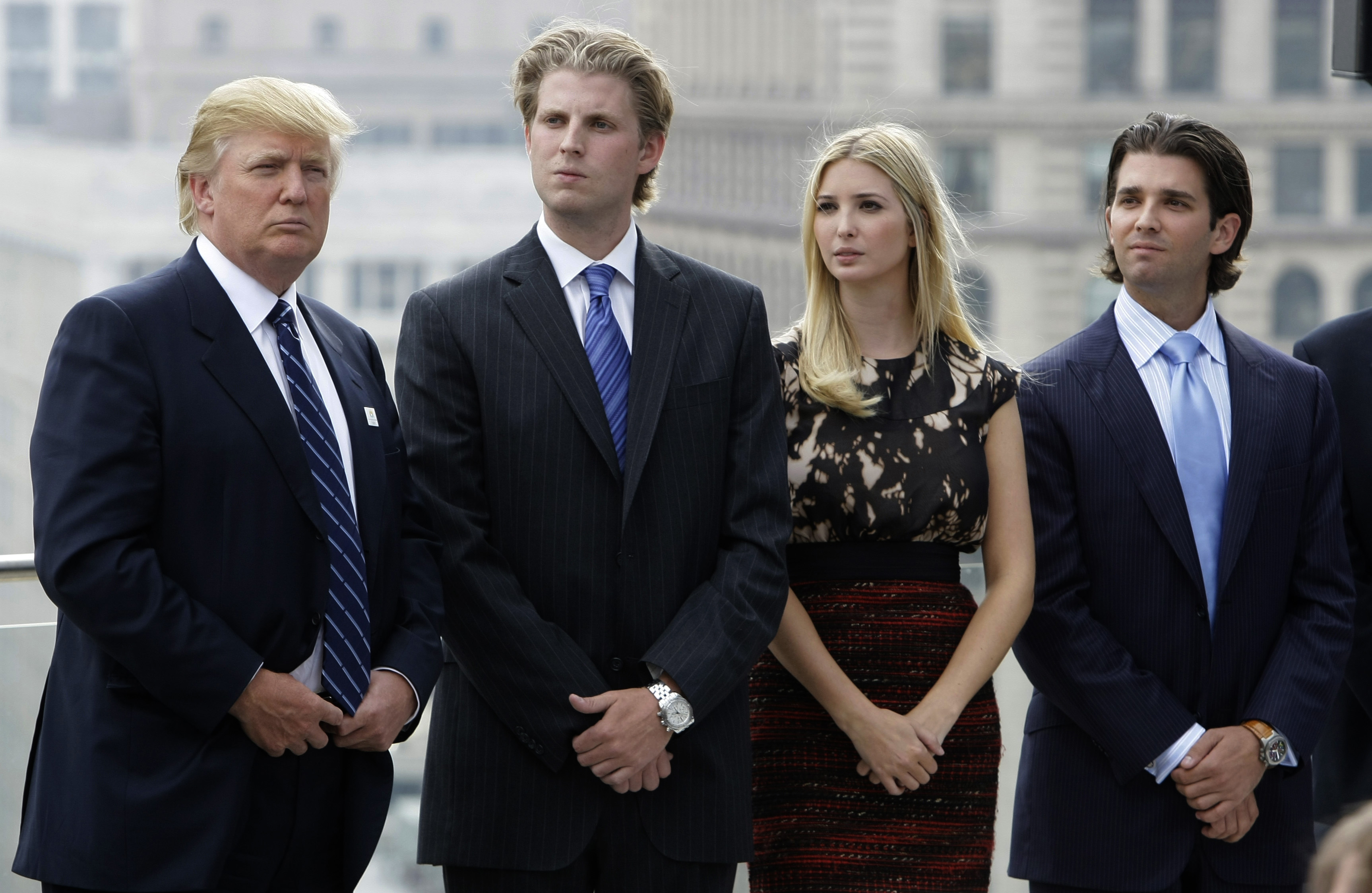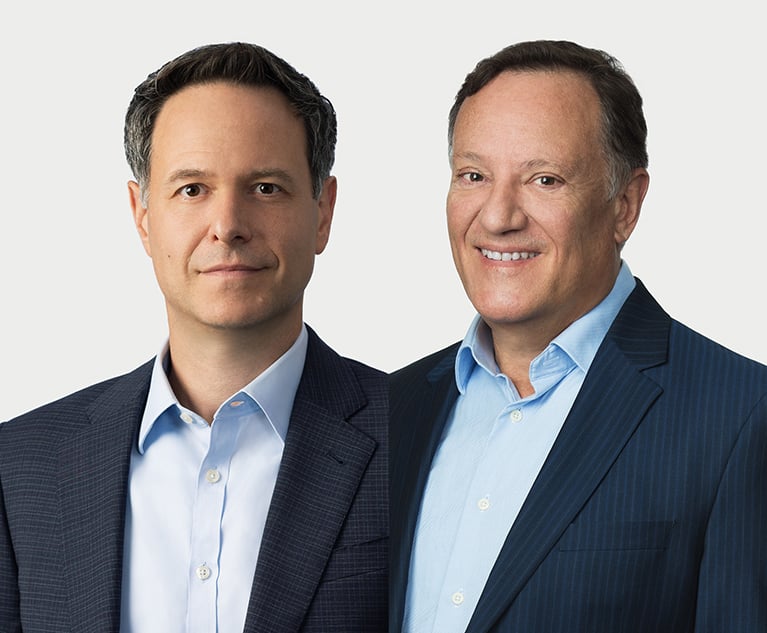Trump and Family Can't Force Arbitration in Fraud Suit, SDNY Judge Rules
"Now that defendants have extracted what they can from the judicial proceedings, they seek to move to a different forum," U.S. District Judge Lorna G. Schofield wrote.
April 09, 2020 at 02:28 PM
4 minute read
 Donald Trump, left, with his children, from left, Eric, Ivanka, and Donald Jr.(AP Photo/Charles Rex Arbogast)
Donald Trump, left, with his children, from left, Eric, Ivanka, and Donald Jr.(AP Photo/Charles Rex Arbogast)
U.S. President Donald Trump and his children cannot force arbitration in a lawsuit alleging that they, and the Trump Corp., had illegally profited from promoting doomed products and services to unsophisticated investors across the country, a Manhattan federal judge ruled late Wednesday.
U.S. District Judge Lorna G. Schofield of the Southern District of New York said in a 16-page opinion that Trump and his children, Ivanka, Eric and Donald Jr., could not avail themselves of arbitration agreements the unnamed plaintiffs had entered in to with ACN Inc., the multilevel marketing company at the center of the allegations.
In any event, Schofield wrote, Trump and his family had waived any right they may have had to resolve the dispute in private, after waiting eight months and securing the dismissal of federal racketeering claims by the proposed class of investors.
"Now that defendants have extracted what they can from the judicial proceedings, they seek to move to a different forum," Schofield wrote.
"This conduct is both substantively prejudicial towards plaintiffs and seeks to use the [Federal Arbitration Act] as a vehicle to manipulate the rules of procedure to Defendants' benefit and plaintiffs' harm. Such tactics undermine a fundamental purpose of the FAA to support the economical resolution of claims," she said.
The lawsuit, filed in October 2018, alleged that Trump had lent his name to promote a number of businesses, knowing there was little to no chance that the money unsavvy investors paid to participate in seminars and training opportunities would ever be recouped.
The complaint specifically highlighted Trump's relationship with ACN, which Trump had endorsed and featured on his reality television show, "The Celebrity Apprentice."
According to the lawsuit, Trump claimed to have prior experience with the products ACN was pushing on investors, saying he had done substantial research and that he wasn't being paid for his endorsement. In reality, however, Trump and his company reaped millions of dollars to promote the firm.
ACN is not a party to the dispute.
On July 24, Schofield dismissed racketeering claims against the Trump family, but ruled that she had jurisdiction over state claims for negligent misrepresentations, common-law fraud and unfair and deceptive trade practices. But it wasn't until July 11, more than eight months after the suit was filed, Schofield said, that defense lawyers told the plaintiffs that they would seek to compel arbitration on any surviving claims.
While the agreements at issue did not include Trump, his children or the Trump Corp., Trump's Spears & Imes attorneys said that his ties to ACN made it clear that the contractual obligations governing arbitration would extend to the defendants.
But Schofield on Wednesday said that argument essentially "turns the amended complaint on its head."
"The amended complaint alleges the opposite—that from the objective perspective of the plaintiffs at the time they signed the agreements, defendants and ACN did not reveal themselves as financially and professionally tied, much less associated in a way that would cause plaintiffs reasonably to predict that their contractual obligations to ACN would create the same obligations with defendants," she said.
Roberta Kaplan, who represents the plaintiffs, said in a statement that Schofield's ruling removed "a number of remaining obstacles" and cleared the way for "proper discovery" in the case.
"We look forward to continuing to gather the evidence to deliver justice for our brave clients, and thousands of others like them who were defrauded by the Trumps," said Kaplan, founding partner of Kaplan Hecker & Fink in Manhattan.
Joanna Hendon, a partner with Spears & Imes, did not immediately respond to a call Thursday seeking comment on the decision.
Read More:
SDNY Judge Clears Way for Class Action Alleging Trump Corporation Pushed Bad Investments
New Class Suit Claims Trump Lured Investors, Whose Loss Was His Gain
9th Circuit Approves $25M Trump University Settlement
This content has been archived. It is available through our partners, LexisNexis® and Bloomberg Law.
To view this content, please continue to their sites.
Not a Lexis Subscriber?
Subscribe Now
Not a Bloomberg Law Subscriber?
Subscribe Now
NOT FOR REPRINT
© 2025 ALM Global, LLC, All Rights Reserved. Request academic re-use from www.copyright.com. All other uses, submit a request to [email protected]. For more information visit Asset & Logo Licensing.
You Might Like
View All
Beastie Boys, Rimon Law Allege Copyright Infringement by Chili's in Social Media Videos
3 minute read
Gibson Dunn Recruits S&C Partner to Co-Lead M&A Practice, in 2-Partner Hire

Law Firms Mentioned
Trending Stories
Who Got The Work
J. Brugh Lower of Gibbons has entered an appearance for industrial equipment supplier Devco Corporation in a pending trademark infringement lawsuit. The suit, accusing the defendant of selling knock-off Graco products, was filed Dec. 18 in New Jersey District Court by Rivkin Radler on behalf of Graco Inc. and Graco Minnesota. The case, assigned to U.S. District Judge Zahid N. Quraishi, is 3:24-cv-11294, Graco Inc. et al v. Devco Corporation.
Who Got The Work
Rebecca Maller-Stein and Kent A. Yalowitz of Arnold & Porter Kaye Scholer have entered their appearances for Hanaco Venture Capital and its executives, Lior Prosor and David Frankel, in a pending securities lawsuit. The action, filed on Dec. 24 in New York Southern District Court by Zell, Aron & Co. on behalf of Goldeneye Advisors, accuses the defendants of negligently and fraudulently managing the plaintiff's $1 million investment. The case, assigned to U.S. District Judge Vernon S. Broderick, is 1:24-cv-09918, Goldeneye Advisors, LLC v. Hanaco Venture Capital, Ltd. et al.
Who Got The Work
Attorneys from A&O Shearman has stepped in as defense counsel for Toronto-Dominion Bank and other defendants in a pending securities class action. The suit, filed Dec. 11 in New York Southern District Court by Bleichmar Fonti & Auld, accuses the defendants of concealing the bank's 'pervasive' deficiencies in regards to its compliance with the Bank Secrecy Act and the quality of its anti-money laundering controls. The case, assigned to U.S. District Judge Arun Subramanian, is 1:24-cv-09445, Gonzalez v. The Toronto-Dominion Bank et al.
Who Got The Work
Crown Castle International, a Pennsylvania company providing shared communications infrastructure, has turned to Luke D. Wolf of Gordon Rees Scully Mansukhani to fend off a pending breach-of-contract lawsuit. The court action, filed Nov. 25 in Michigan Eastern District Court by Hooper Hathaway PC on behalf of The Town Residences LLC, accuses Crown Castle of failing to transfer approximately $30,000 in utility payments from T-Mobile in breach of a roof-top lease and assignment agreement. The case, assigned to U.S. District Judge Susan K. Declercq, is 2:24-cv-13131, The Town Residences LLC v. T-Mobile US, Inc. et al.
Who Got The Work
Wilfred P. Coronato and Daniel M. Schwartz of McCarter & English have stepped in as defense counsel to Electrolux Home Products Inc. in a pending product liability lawsuit. The court action, filed Nov. 26 in New York Eastern District Court by Poulos Lopiccolo PC and Nagel Rice LLP on behalf of David Stern, alleges that the defendant's refrigerators’ drawers and shelving repeatedly break and fall apart within months after purchase. The case, assigned to U.S. District Judge Joan M. Azrack, is 2:24-cv-08204, Stern v. Electrolux Home Products, Inc.
Featured Firms
Law Offices of Gary Martin Hays & Associates, P.C.
(470) 294-1674
Law Offices of Mark E. Salomone
(857) 444-6468
Smith & Hassler
(713) 739-1250







